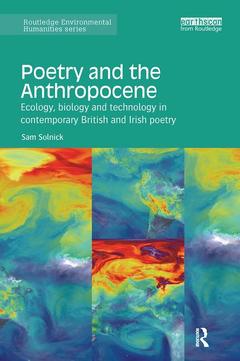Poetry and the Anthropocene Ecology, biology and technology in contemporary British and Irish poetry Routledge Environmental Humanities Series
Auteur : Solnick Sam

This book asks what it means to write poetry in and about the Anthropocene, the name given to a geological epoch where humans have a global ecological impact. Combining critical approaches such as ecocriticism and posthumanism with close reading and archival research, it argues that the Anthropocene requires poetry and the humanities to find new ways of thinking about unfamiliar spatial and temporal scales, about how we approach the metaphors and discourses of the sciences, and about the role of those processes and materials that confound humans? attempts to control or even conceptualise them.
Poetry and the Anthropocene draws on the work of a series of poets from across the political and poetic spectrum, analysing how understandings of technology shape literature about place, evolution and the tradition of writing about what still gets called Nature. The book explores how writers? understanding of sciences such as climatology or biochemistry might shape their poetry?s form, and how literature can respond to environmental crises without descending into agitprop, self-righteousness or apocalyptic cynicism. In the face of the Anthropocene?s radical challenges to ethics, aesthetics and politics, the book shows how poetry offers significant ways of interrogating and rendering the complex relationships between organisms and their environments in a world increasingly marked by technology.
Introduction: poetry and science 1. Evolving systems of (eco)poetry 2. ‘Life subdued to its instrument’: Hughes, mutation and technology 3. ‘Germinal ironies’: changing climates in the poetry of Derek Mahon 4. The resistant materials of Jeremy Prynne Conclusion: Evolution, agency and feedback at the end of a world
Sam Solnick is the William Noble Research Fellow in the Department of English at the University of Liverpool, UK.
Date de parution : 04-2018
15.6x23.4 cm
Date de parution : 08-2016
15.6x23.4 cm
Thèmes de Poetry and the Anthropocene :
Mots-clés :
Simulative Politics; Prynne’s Work; Biodiversity; Iron Woman; Climate Change; Mahon’s Poem; Conservation; Young Men; Derek Mahon; Reverse Transcription; Environmental policy; Irish Poetry; Environmental studies; Crow’s Account; J; H; Prynne; Great Acceleration; Ted Hughes; Global Boundary Stratotype Section; aesthetics; Pair Rule Genes; Stratigraphic Marker; Early Ecocriticism; Hughes’s Work; British Ecocriticism; Harbour Lights; Iron Man; OOO; Status Quo Concepts; Imaginary Parks; Hughes’s Descriptions; Hominid Brain Evolution; Good Life; Romantic Ecology



